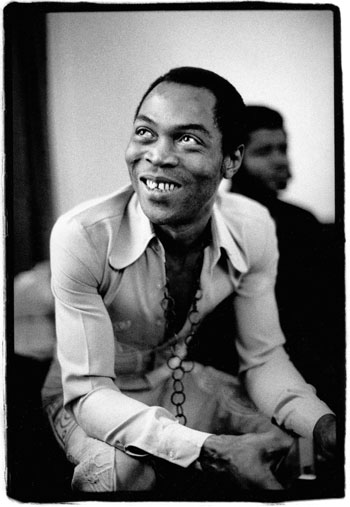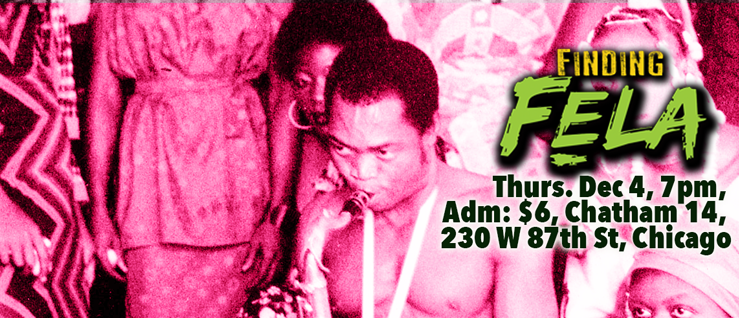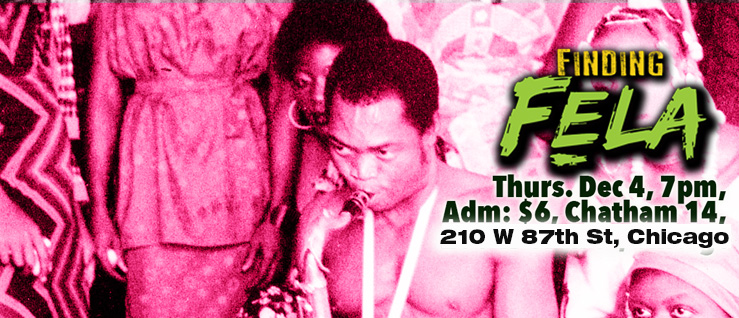Finding Fela, Dec 4th, 7pm Chatham 14
by
Thursday, December 4 at 7:00pm
Chatham 14 Theaters
210 W 87th St.
Chicago, IL
Admission $6
FREE PARKING
Finding Fela (2013), UK 119 Minutes
Director: Alex Gibney
Finding Fela tells the story of Fela Anikulapo Kuti’s life, his music, his social and political importance. He created a new musical movement, Afrobeat, using that forum to express his revolutionary political opinions against the dictatorial Nigerian government of the 1970s and 1980s. His influence helped bring a change towards democracy in Nigeria and promoted Pan Africanist politics to the world. The power and potency of Fela’s message is completely current today and is expressed in the political movements of oppressed people, embracing Fela’s music and message in their struggle for freedom. Finding Fela was directed by the Academy Award winning director, Alex Gibney.
Fela Kuti, Musical Innovator and Human Rights Activist

Fela Ransome Kuti was born in Abeokuta, Nigeria, north of Lagos in 1938. His father was a Christian schoolmaster, minister and master pianist and his mother was a world-recognized feminist leader, who was very active in the anti-colonial Nigerian women’s movement during the struggle for independence.
Fela was educated in Nigeria amongst the indigenous elite. Ironically, many of his classmates in his Nigerian school would become the very military leaders he so vociferously opposed.
With medical aspirations for their offspring (Fela’s older brother. Koye, was to become a Deputy Director of the World Health Organization and his younger brother, Beko, President of the Nigerian Medical Association) in 1958 Fela’s parents sent him to London for a medical education. Instead, he registered at Trinity College’s school of music where he studied composition and chose the trumpet as his instrument. Quickly tiring of European composers, Fela, struck by Miles Davis and Frank Sinatra, formed the Koola Lobitos in 1961, and his band became a fixture in London’s club scene. Two years later, Fela returned to Nigeria, restarted the Koola Lobitos, and became influenced by James Brown. Trying to find an authentic musical voice, he added elements of traditional Yoruba, high life and jazz, and “Afrobeat” was born. In 1969, Fela’s Koola Lobitos traveled to Los Angeles to tour and record. During his eight months in the US, with LA as a home base, Fela befriended Sandra Izsadore, who introduced him to the writings and politics of Malcolm X, Eldridge Cleaver and other proponents of Black nationalism and Afrocentrism.
With this new politically explicit and critical worldview, Fela reformed the Koola Lobitos as Nigeria 70 and returned to Lagos. He founded a commune/recording studio called the Kalakuta Republic, complete with his own private nightclub, The Shrine, and Fela dropped his given middle name “Ransome,” and replaced it with a Yoruba name “Anikulapo” (meaning “he who carries death in his pouch”). Playing constantly and recording at a ferocious pace, Fela and band (who were now called Africa 70) became huge stars in West Africa and beyond. His music served as a rallying cry for the disenfranchised, critiquing the military government, and made Fela not only a pop star but thrust him into political life. People took to the streets singing his songs and the military responded by viciously harassing Fela, jailing him and nearly killing him on several occasions.
In 1977, during a government-sanctioned attack on his Kalakuta Republic commune, Fela and other members of his commune were arrested; Fela himself suffered a fractured skull as well as other broken bones; a number of women living at Kalakuta were beaten and raped; and his 82-year old mother was thrown from an upstairs window, inflicting injuries that would later prove fatal. The soldiers set fire to the compound and prevented fire fighters from reaching the area. Fela’s recording studio, all his master tapes and musical instruments and the only known copy of his self-financed film Black President were destroyed.
After the Kalakuta tragedy, Fela briefly lived in exile in Ghana, returning to Nigeria in 1978. A year later, he formed his own political party, MOP (Movement of the People) and ran for president in two elections, although his campaigning was consistently blocked by the military. As the ’80s ended, Fela recorded blistering attacks against Nigeria’s corrupt military government.
Fela Anikulapo-Kuti was arrested more than two hundred times in his life, and charged with almost every conceivable crime, although only serving one eighteen month sentence in jail for a currency violation. Despite this constant harassment he continued to live in Nigeria even though, as an icon in the international world of rock and roll, soul, jazz and hip-hop, he could have at any point abandoned Nigeria and led the life of an international music superstar. His death on August 3, 1997 of complications from AIDS deeply affected musicians and fans internationally, as a unique and ineffable musical and sociopolitical voice was lost. In Nigeria one million people attended his funeral. His incredible body of work, almost 70 albums, is now available, through public demand, all over the world.

